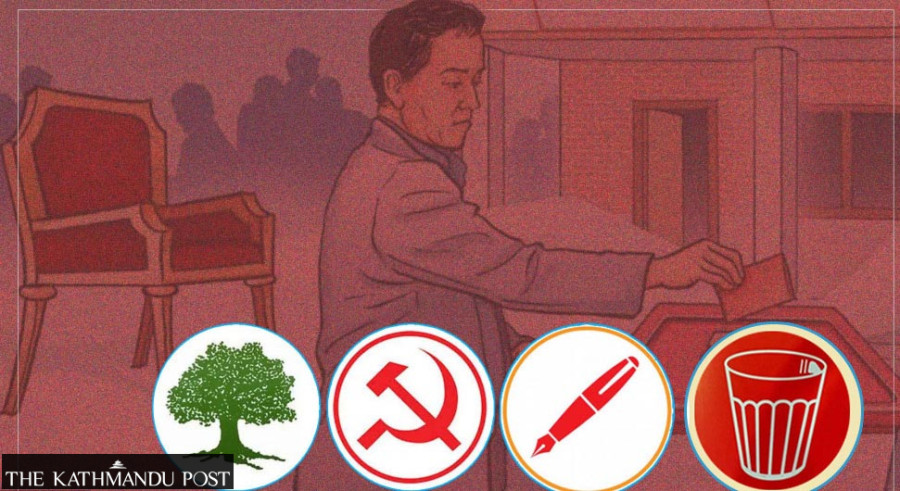Politics
No takers as coalition promises political stability
Maoist Centre chair Dahal, a key coalition partner, publicly boasts of having played a key role in forming and toppling governments.
Purushottam Poudel
The electoral alliance led by the Nepali Congress has made ensuring political stability in the country a major election agenda. Also, the CPN (Maoist Centre), the second-largest force in the coalition, has claimed that it would give priority to political stability.
Congress and Maoist leaders have accused the alliance’s major rival CPN-UML and its leader KP Sharma Oli of instigating instability in the country by dissolving parliament, twice.
However, many doubt the Maoist Chairman Pushpa Kamal Dahal’s pledge, given his track record.
Following 10 years of insurgency, the Maoists had promised that the country would see political stability. Several mergers and demergers later and even after donning their latest avatar the Maoist Centre, the main intent of the Maoists seems to be aimed at short-term gains in power play.
Pushpa Kamal Dahal, the chairman of the Maoist party, who has been accused of causing instability in the country in recent years, has declared that his party will be the third, but decisive force after the elections. While saying so, he indicated that he will be key in forming and dissolving the government, say experts.
“Dahal claiming his party would be the third-largest clearly hints at the continuity of the political instability,” said political analyst Rajesh Gautam. “In the given mixed electoral system of direct and proportional representation, any party winning a majority of the seats in parliament is unlikely.”
Former chief election commissioner, Ayodhi Parsad Yadav, echoed Gautam.
“The kind of election system that we are in will lead us to a hung parliament,” Yadav told the Post. “Political stability under the present electoral system will be unrealistic to claim.”
Dahal is often criticised for promoting political instability after the political change of 2006 as he has been engaged in frequently forming and toppling governments. Dahal himself has publicly boasted to have played a key role in forming and toppling various governments in the past decade.
Therefore, the commitment of political stability of the ruling coalition with Dahal as a major participant is doubtful, say observers.
“When the Maoists, who didn’t believe in the parliamentary system, joined parliamentary politics to fulfil their interests, they promoted political instability by forging alliances with unnatural partners and always kept them engaged in power games,” said Mumaram Khanal, a political analyst who was a Maoist cadre during the insurgency.
Dahal has laid claims to the leadership of the next government in the event of the coalition winning the elections. Analysts believe that if the current coalition wins a majority in elections, disagreements will start to surface over who will lead the government, and that will eventually lead the country towards a political uncertainty.
Though the Maoists took the lead in the first Constituent Assembly in 2008 with 229 seats in the 601-member Constituent Assembly, that did not quite yield the expected political outcome. The then CPN-Maoist, the largest political party in the first constituent assembly, couldn’t efficiently run the government. Dahal quit the government nine months after he assumed office, following a dispute over his move to sack the then army chief. Then, his party got relegated to the third position in the second constituent assembly held in 2013, winning only 83 seats.
The Maoists helped KP Sharma Oli, the chair of the CPN-UML, to become the prime minister in 2015. Later, they withdrew their support to Oli and formed the government under the leadership of Pushpa Kamal Dahal, the party chair.
Subsequently, the Maoists helped the Nepali Congress chief Sher Bahadur Deuba to become the prime minister. None of the governments served even for a full year.
Later, Oli returned as prime minister with Maoist support in the 2017 elections, when the two communist parties also forged an electoral alliance. Based on that alliance, later they merged the two parties and formed a unified Nepal Communist Party that commanded nearly two-thirds of the parliament. But that didn’t last for a full term either.
The Oli government lasted until 2021 before the Maoists once again withdrew their support and forged a new political alliance with Deuba, which enabled him to become the prime minister. The arrangement continues to date and preparations are on to fight the next federal and provincial elections later this month, with the same alliance.
“The parliamentary system was not one envisioned by the Maoist Centre, they were forced to participate in the system,” said CK Lal, a political analyst. “So they have been doing whatever benefited their party leaders under the system. Creating political instability has been one of their characters.”
However, central committee member of CPN (Maoist Centre) Peshal Khatiwada denies the allegations.
“It is not the Maoist Centre that has created instability, it’s the parliamentary democracy,” Khatiwada argued. “The chances of political instability will remain unless Nepal makes a switch to the presidential form of government.”
The party has promised a change in the political system—from the present parliamentary democracy to a presidential system—in its electoral manifesto as well.




 17.12°C Kathmandu
17.12°C Kathmandu















